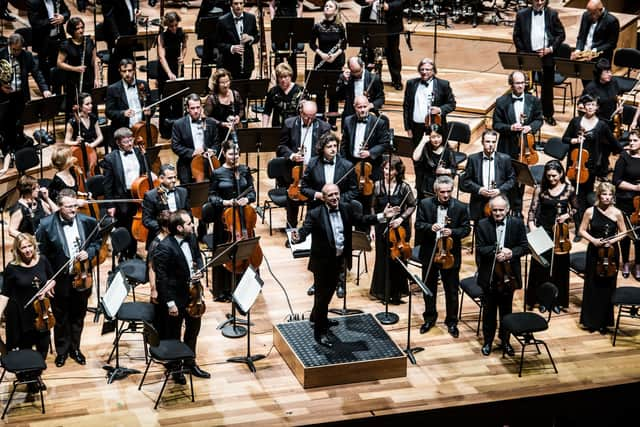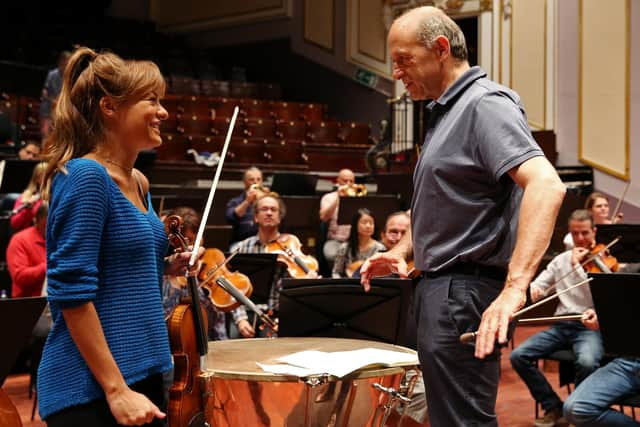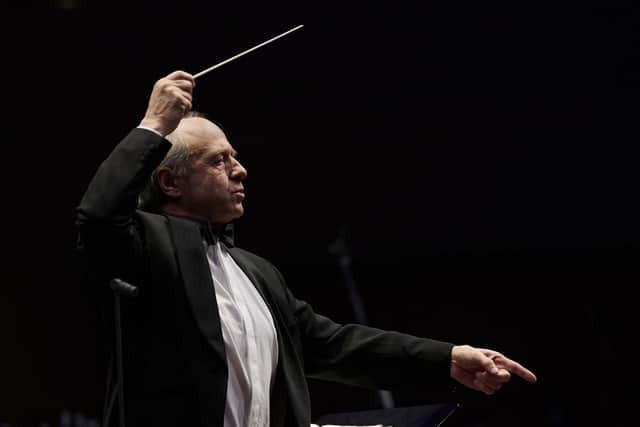Edinburgh International Festival preview: Iván Fischer and the Budapest Festival Orchestra
Three years ago, the music critic of the New York Times was utterly blown away by the Budapest Festival Orchestra when its members stood up and sang three short choral pieces by Dvořák as a scene-setter to one of the same composer’s symphonies. “Maybe that explains why their playing in the Eighth Symphony sang out with such fullness and breadth, and why chordal passages had such strong hints of a church choir,” wrote a fascinated Anthony Tommasini.
In May this year I watched the same orchestra, under its 72-year-old founder and conductor Iván Fischer, rehearse Mahler’s Ninth for a performance later that evening in London’s Royal Festival Hall. The rehearsal began, not with a song, but with a chromatically-complex Bach chorale played by the wind and brass, Fischer encouraging his players to fine-tune Bach’s florid part-writing and articulate its phrasing with leisurely breaths, imbuing the warm-up exercise with a natural sung quality and musicality.
Advertisement
Hide AdAdvertisement
Hide Ad“It takes only two minutes, but it’s a beautiful way to start,” Fischer believes. As a result, Mahler’s faltering, quivering opening to the Ninth Symphony – painstakingly perfected by Fischer – was viscerally breathtaking.


There can’t be many orchestras around today whose players would undergo such unorthodox – more cynical musicians might say patronising – coaching, which is why the BFO, celebrating its 40th birthday this year, remains unique in its sustained and willing adherence to Fischer’s radical vision to “develop an orchestra that is in touch with today’s young generation and future generations.”
What does this mean, though, for the predominantly regimented classical audiences of today, routinely submissive to an unwritten contract that requires them to sit stiffly through a formulated concert format, contributing applause at the appointed moments, perhaps tutting sniffily at those who eschew conventional etiquette and do their own thing?
Fischer has no time for stifled orthodoxy, having made it his life’s work, along with his players, to ring the changes and lead by example. “We operate a completely different type of working schedule – different auditioning system, different rehearsal methods. As a result of these reforms we sound completely different from any other orchestra I know,” he insists.
"If I were to describe what the fundamental difference is, it’s that our players have a lot of joy in what they do, and they share that joy with our audiences. This orchestra feels like a group of artists who really live for the music; it doesn’t feel like they use music merely to live.”


How it works in practice will be apparent in the BFO’s upcoming four-concert Edinburgh International Festival residency at the Usher Hall. It will be a revealing, if not always psychologically comfortable, journey for conservative concertgoers. Dvorak’s joyously popular Eighth Symphony features once again, but with listeners lounging on beanbags scattered in and around the orchestra and being encouraged to ask questions.
Previous Festival visits have been more regular affairs. “Very often when we’re on tour we’re just asked to do normal, predictable concerts,” Fischer says. “This time we get to show our real profile.”
Advertisement
Hide AdAdvertisement
Hide AdThe sheer diversity contained within their Edinburgh residency is mouthwatering: specialist groups from within the BFO’s ranks variously engaging in authentic Baroque, Transylvanian folk and Jewish Klezmer in their opening programme; playing havoc with the Usher Hall’s fixed seating for the beanbag extravaganza (“It’s always a technical challenge but we’ll do our best,” Fischer cautiously promises); and ending with two standard orchestral programmes. One is a veritable Hungarian feast of music by Bartók and Kodály with guest pianist Sir András Schiff. The other, German Romantic in focus, compares the sibling talents of Felix and Fanny Mendelssohn.
In sum, it’s a perfect fit with the challenge set out in Nicola Benedetti’s debut programme as EIF director, which is to ask the question mooted in Dr Martin Luther King’s Jr’s book, Where Do We Go From Here: Chaos or Community? Benedetti herself will present the orchestra’s informal opening event. Called A Model For The Future, it’s a showcase for the central objectives driving Fischer’s radical orchestral philosophy: engagement, empowerment and versatility.


“How to create a meaningful contact with the audience is a very interesting question,” says Fischer. “Because a symphony orchestra is quite large, it’s too easy for the musicians to feel only each other’s reactions, so they are less aware of the people in the hall. What I try to encourage is an awareness of the audience, that the musician actually plays for them. If you only play for your colleagues you don’t want to make mistakes, you want to impress. If the audience is your focus, those things don’t make sense; you have to offer an emotional, spiritual value that resonates with the listener.”
That, he adds, requires a different attitude, not least creating an environment in which the musicians feel free to think for themselves. “It doesn’t always make my job easy. Allowing musicians to take lots of artistic initiative is effectively to create an undisciplined orchestra, but I like it that way because it’s much more alive. Okay, I have to do a bit of uniting and organising and reminding them to not be too individual, so there’s a little more work than with conventional orchestras. But the result is better. Musicians who play from their heart do it far better than those who only follow instructions.”
As for versatility, Fischer defines the BFO as “a pool of musicians” rather than a single unit. “This was Pierre Boulez’s idea and one I imported quickly into our own thinking: that an orchestra should be capable of making music in a variety of formats and styles. We have musicians who are very good jazz players, so why shouldn’t that be part of our core activity? It’s not a hobby, we integrate it into our programmes.
Fischer, who still guest conducts “regular orchestras” worldwide, is not the least protective of the BFO’s groundbreaking ways. Covid, he says, has forced all orchestras to look carefully at how to recover and take stock of where things go. “My prediction would be that those orchestras who survive will be those who change their rigid systems. They have to break through negotiated agreements, habits, traditions and all the other barriers.”
Fischer identified all this 40 years ago, of course, and given the popularity of his orchestra among growing audiences in Budapest, it’s clearly the way to go.
The Budapest Festival Orchestra is at the Usher Hall, 8-10 August